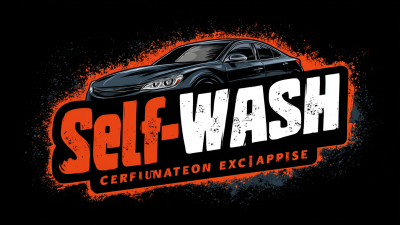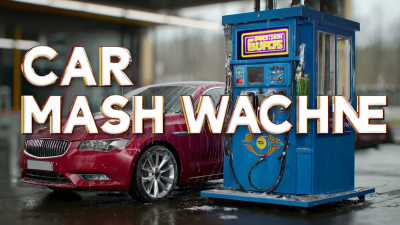Discover the Benefits of Investing in Self Wash Car Wash Equipment for Your Business
 Investing in Self Wash Car Wash Equipment is becoming a pivotal decision for entrepreneurs looking to capitalize on the robust growth of the car wash industry, projected to reach $38.4 billion by 2026 according to recent market analysis reports. As consumers increasingly prefer convenience and cost-effectiveness, self-service car washes are gaining popularity due to their lower operational costs and the ability to cater to diverse customer needs.
Research indicates that facilities equipped with advanced self wash technology can improve throughput, enhance customer satisfaction, and boost revenue significantly. The trend towards self service is not just a fleeting phenomenon; it represents a fundamental shift in consumer behavior and business models within the auto care sector. By investing in high-quality Self Wash Car Wash Equipment, businesses can position themselves at the forefront of this evolving market, ensuring long-term success and profitability in an increasingly competitive landscape.
Investing in Self Wash Car Wash Equipment is becoming a pivotal decision for entrepreneurs looking to capitalize on the robust growth of the car wash industry, projected to reach $38.4 billion by 2026 according to recent market analysis reports. As consumers increasingly prefer convenience and cost-effectiveness, self-service car washes are gaining popularity due to their lower operational costs and the ability to cater to diverse customer needs.
Research indicates that facilities equipped with advanced self wash technology can improve throughput, enhance customer satisfaction, and boost revenue significantly. The trend towards self service is not just a fleeting phenomenon; it represents a fundamental shift in consumer behavior and business models within the auto care sector. By investing in high-quality Self Wash Car Wash Equipment, businesses can position themselves at the forefront of this evolving market, ensuring long-term success and profitability in an increasingly competitive landscape.
Benefits of Self Wash Car Wash Equipment for Increasing Profit Margins
Investing in self-wash car wash equipment can significantly increase profit margins for businesses in the automotive service industry. According to a report by IBISWorld, the car wash industry in the United States is expected to reach $11 billion by 2023, growing at an annual rate of 3.5%. This growth is driven by a rising number of vehicles on the road and a growing consumer preference for convenient, self-service options. By integrating self-wash stations, operators can reduce labor costs while catering to customers seeking a hands-on experience.
Moreover, self-wash car wash equipment tends to have lower operational costs than full-service washes. The 2020 Car Wash Industry Survey indicated that self-service washes can achieve profit margins of around 50%, compared to 30% for traditional full-service models. This is primarily due to limited staff requirements and the ability to operate 24/7 without increasing labor hours. Additionally, with the increase in eco-conscious consumers, the efficiency of self-wash systems, which often use less water and eco-friendly detergents, can also appeal to environmentally aware customers, further driving sales and enhancing brand image in a competitive market.

Key Statistics Highlighting the Growth of the Self-Service Car Wash Industry
The self-service car wash industry has experienced remarkable growth in recent years, evidenced by compelling statistics that underscore its rising popularity. According to a report by IBISWorld, the self-service car wash market in the United States is projected to reach approximately $1.6 billion by 2024, reflecting an annual growth rate of nearly 3.5% from 2019 to 2024. This growth can be attributed to various factors, including the increasing consumer preference for hands-on experiences and the cost-effectiveness of self-service car washes compared to traditional full-service options.
Furthermore, a study conducted by Grand View Research highlights that the global self-service car wash market size was valued at $4.9 billion in 2021 and is anticipated to expand at a compound annual growth rate (CAGR) of 6.1% from 2022 to 2030. This trend signifies a shift in consumer behavior, with more individuals recognizing the convenience and environmental benefits of self-washing their vehicles. As the industry continues to grow, investing in self-wash car wash equipment represents a lucrative opportunity for business owners looking to capitalize on this compelling market expansion.
Understanding Customer Preferences in the Self-Service Car Wash Market
As the self-service car wash market continues to expand, understanding customer preferences is essential for business success. Recent industry reports indicate that the self-service car wash segment has seen a growth rate of approximately 4% per year, driven by increased consumer demand for convenience and cost-effectiveness. Customers are increasingly leaning towards eco-friendly solutions, with 65% of car wash patrons prioritizing water-efficient systems. This shift highlights the importance of investing in modern self wash car wash equipment that not only meets cleaning needs but also aligns with environmental concerns.
Tips for choosing the right equipment include focusing on customer experience. Invest in user-friendly payment systems and clear instructions to help first-time users feel comfortable. Additionally, surveys show that offering a variety of wash options—such as foam brushes, high-pressure rinses, and drying features—can boost customer satisfaction, as 70% of users prefer customizable wash experiences. Staying informed about trends and preferences will enable you to tailor your services effectively, setting your business apart in a competitive marketplace.
Discover the Benefits of Investing in Self Wash Car Wash Equipment for Your Business
| Feature | Importance (%) | Customer Preference (%) |
|---|---|---|
| Equipment Durability | 25% | 85% |
| Ease of Use | 30% | 90% |
| Cleaning Effectiveness | 35% | 70% |
| Maintenance Requirements | 10% | 60% |
Cost Analysis: Initial Investment vs. Long-term Profitability of Self Wash Equipment
Investing in self-wash car wash equipment can seem daunting, particularly when considering the initial financial outlay. However, conducting a thorough cost analysis reveals that the upfront investment can be overshadowed by the long-term profitability it offers. The initial costs include purchasing state-of-the-art washing systems, site preparation, and installation. Nevertheless, these costs can be recouped quickly as the self-service model typically requires lower overhead expenses due to reduced labor costs.

Moreover, the long-term benefits of self-wash car wash equipment are compelling. As customers increasingly seek convenient, self-service options, businesses can expect consistent traffic and steady revenue. With minimal maintenance and operating costs, profit margins can be significantly enhanced. Additionally, the flexibility of pricing and service options allows for adaptability to market demands, further strengthening profitability over time.
This blend of initial investment against long-term financial gain showcases self-wash car wash equipment not just as a service model, but as a strategic business decision that can yield substantial returns.
Tips for Choosing the Right Self Wash Car Wash Equipment for Your Business Needs
When investing in self wash car wash equipment, it's crucial to choose the right systems that align with your business requirements. According to a report by IBISWorld, the car wash industry in the U.S. generates over $11 billion annually, underscoring the demand for effective self-service washing options. Key considerations include the type of equipment, water efficiency, and ease of use. Look for systems that utilize high-pressure washers and eco-friendly soaps to attract environmentally conscious customers.
Additionally, user experience plays a significant role in customer retention. A 2020 survey indicated that 72% of customers prefer facilities that offer advanced payment options and touchless washing features. Investing in equipment with digital payment systems and user-friendly interfaces not only enhances convenience but also streamlines the washing process, ultimately increasing customer satisfaction. By aligning your equipment choices with the latest technological advancements and customer preferences, your business can maximize both efficiency and profitability.
Related Posts
-

What is Self Serve Car Wash Equipment and How It Transforms the Car Wash Industry?
-

Future Trends in Car Wash Machine Equipment at the 138th Canton Fair 2025
-

How to Navigate Import and Export Certifications for the Best Self Wash Car Wash Equipment
-

Maximizing After-Sales Support and Cost-Efficient Repairs: The Future of Business Car Wash Machines
-

Top Strategies for Optimizing Self Serve Car Wash Equipment to Boost Revenue and Customer Satisfaction
-

7 Essential Features of the Best Car Wash Machine for Business Success